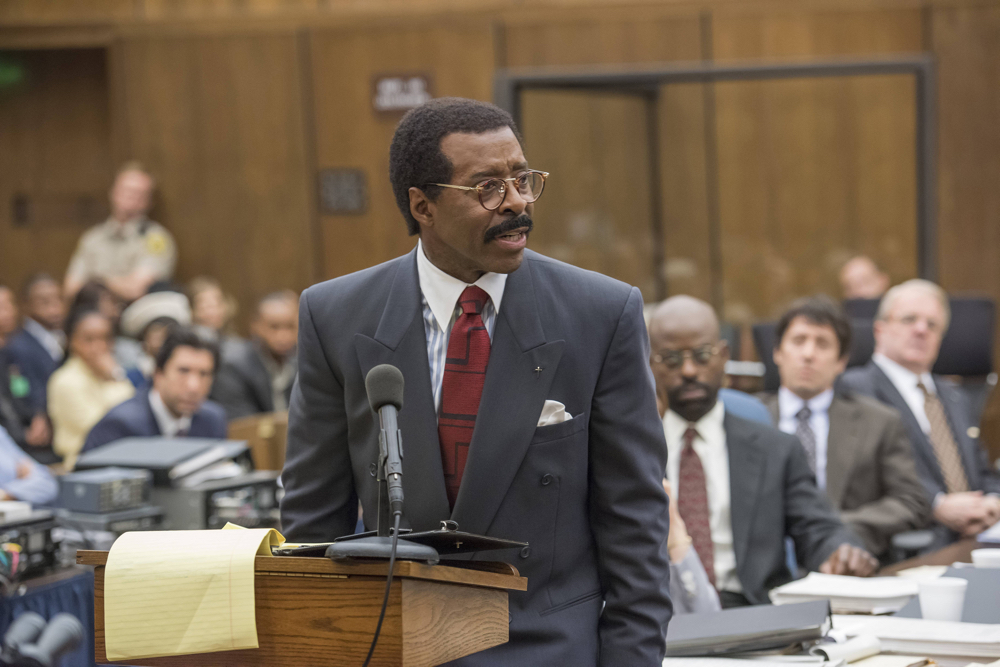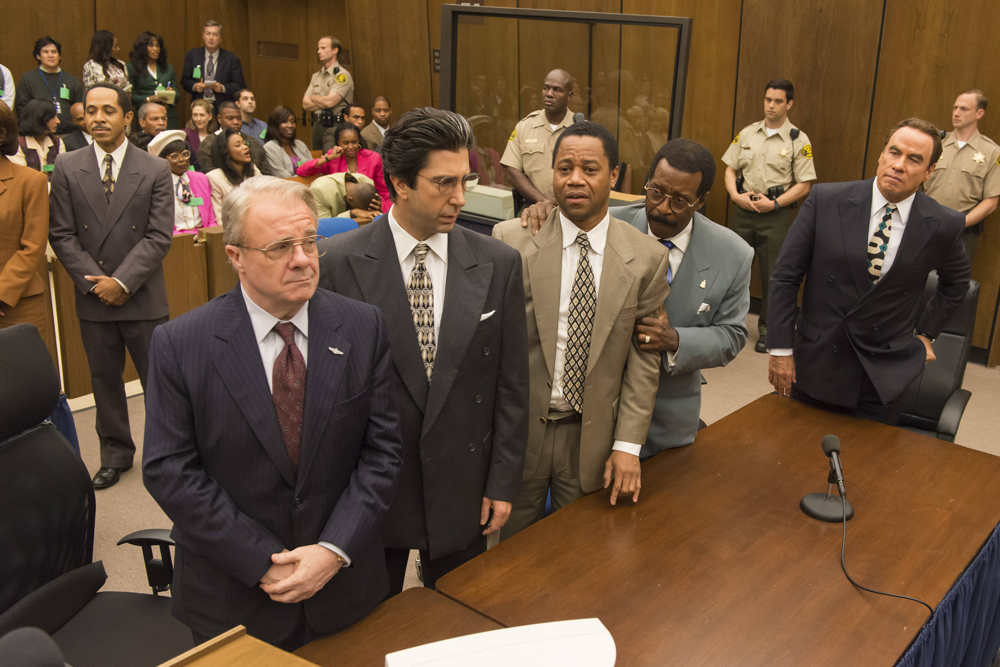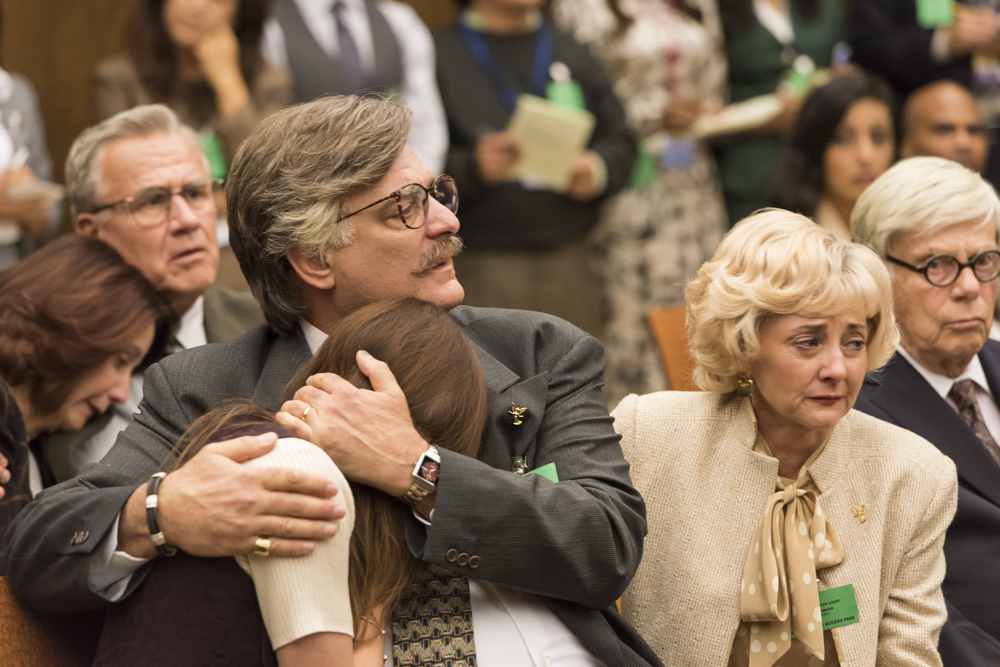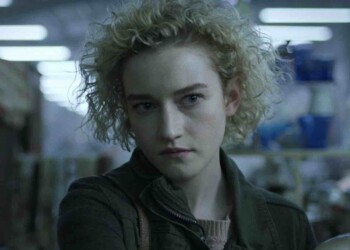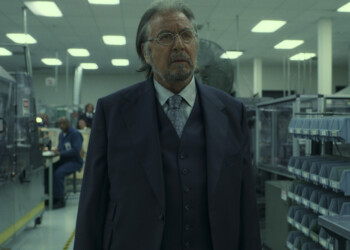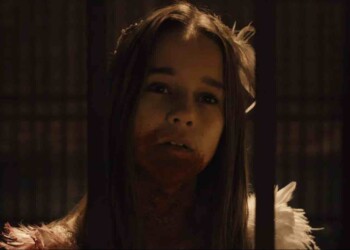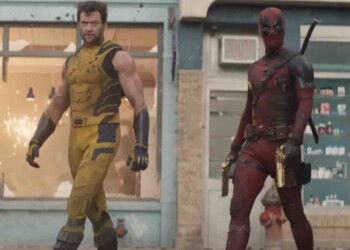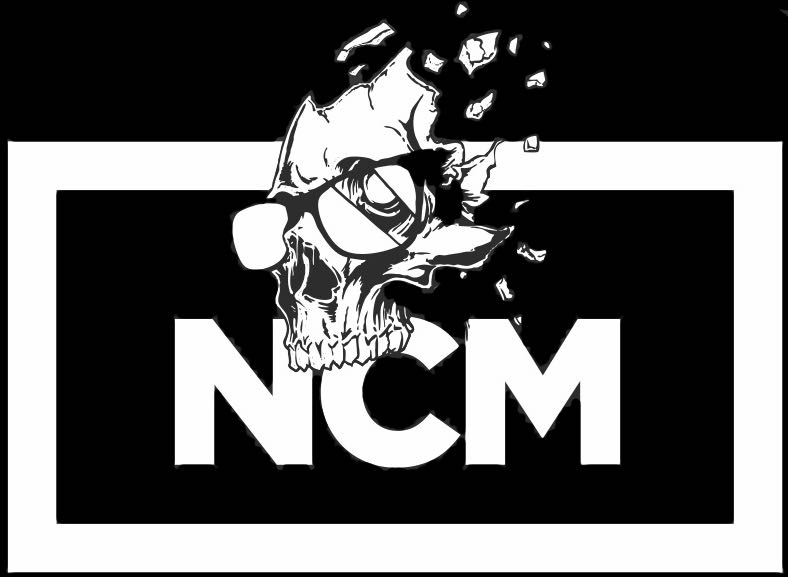In the final The People vs. OJ Simpson recap, the verdict comes in from the jury and the aftermath rocks everybody involved with the case…
By Damon Martin — Editor/Lead Writer
Everybody knew how this show would end.
From the day American Crime Story: The People vs. OJ Simpson was announced and eventually launched, anybody who was tuning into the show understood that when it was all over, Simpson walked free with a not guilty verdict.
But the brilliance of this 10-episode masterpiece was showcasing the journey how we got to the not guilty verdict and then brilliantly showing the aftermath for everybody involved. The 90-minute finale wasn’t finished after 12 jurors took two hours to decide that Simpson played no part in the brutal execution of his ex-wife and her friend Ron Goldman, but instead showed how this trial affected each and every person involved.
The series also showcased how little the world has changed since the Simpson verdict.
It’s hard to say if a show like The People vs. OJ Simpson could ever be duplicated because this really was a snapshot in time. This trial was akin to the JFK assassination to anybody alive in the mid-1990’s who could remember how this unfolded so vividly right before our very eyes.
I’ll never forget it.
I was a freshman in my first year as a student at the University of Cincinnati and while classes clearly ate up most of my time, when I wasn’t studying, like the rest of the world I had the TV on in the background as we were all fascinated by the “trial of the century”. I remember I was sitting in my dorm room when the verdict was read and I heard screams of celebration from outside in the hallway as many of the people on my floor high-fived and cheered like we all won something by Simpson being acquitted.
Others were angry and despondent as a result of Simpson’s not guilty verdict. How could a jury look at that mountain of evidence and not convict him? How could we be so blind that we let a killer walk free?
If you remembered the Simpson trial, you had an opinion and it all came flooding back during this series and for the newcomers who never experienced this phenomenon growing up, it was a lesson in how fame, fortune and race can often times play as much of a factor as truth in our justice system. Right or wrong, guilty or not guilty, those pieces all played a part in Simpson’s trial and we all watched it unfold first hand during this series before it led to this final episode.
So with that let’s recap The People vs. OJ Simpson one last time for the final episode titled ‘The Verdict’…
Closing Arguments
At the end of a trial that lasted nine months, it was finally time for closing arguments but not before the defense argued to allow OJ Simpson to make a statement of his own. Typically in these scenarios a defendant is allowed to decline to testify but there’s not any exposition or explanation in that statement, but Judge Lance Ito actually allows Simpson to speak where he of course claims innocence. Marcia Clark is livid because she wants nothing more than to put him on the stand and start tearing holes into what she believes is a paper thin defense he’s clinging to.
But Simpson makes his statement before the attorneys move onto closing statements.
Clark and Christopher Darden are passionate as they paint the picture of Simpson as a serial abuser, who routinely beat and tormented his wife before he finally snapped and killed her along with a friend on that fateful night in 1994. Clark doesn’t hide that Mark Fuhrman is a racist idiot but that doesn’t mean he planted evidence or fouled up the collection of key pieces that would lead to Simpson’s conviction. Darden follows with an equally powerful statement as he paints Simpson in a vicious light, one filled with hundreds of stab wounds and covered in blood.
Meanwhile, Johnnie Cochran plans his counter with surgical precision while turning the tables on Fuhrman and turning him into LA’s answer to Adolf Hitler. He discounts the physical evidence and leaves the jury with the most glaring example of Simpson’s innocence — a glove that simply would not fit and so they must acquit.
Following the arguments, the jury is excused to begin deliberations as the attorneys all plan on an exit from the courthouse with trips to Santa Monica, San Francisco and speaking engagements all around the country while they wait for the verdict. Both prosecution and defense believe this will be a long, arduous process with the jury likely taking days or weeks to come back with a verdict.
To everyone’s surprise, the jury takes only two hours to make the final call.
The lawyers all rush back from wherever they were going while Simpson gets a vote of confidence from the police officer charged with guarding his cell. He tells Simpson that after talking to his buddies at the building where the jury is being held that he shouldn’t worry about what’s going to happen once the verdict is read. He even gets Simpson to sign a football before he leaves jail for the last time.
At the courthouse, opinions are split on what verdict is coming back. Many believe a quick verdict almost always favors the prosecution but Marcia Clark already saw what was coming. She had doubts about far more jurors that she felt confident in returning a guilty verdict and it was clear that with a quick turn around those people were probably swayed the other direction.
Plus nine months sequestered away from friends, family and homes, these jurors were tired and wanted nothing more for this entire ordeal to be over.
So with tension so thick you could cut it with a knife, Ito receives the verdict and hands it over to the court reporter to read. A few seconds later the only words anybody could hear are these two — not guilty.
Crowds watching from around the world erupt — some in celebration, others in protest. Inside the courtroom, Simpson smiles and receives hugs from his defense team. Marcia Clark looks disgusted. Chris Darden looks rejected. And the Goldman family looks crushed. For a part that only demanded a few lines all season long, Joseph Siravo delivered one of the most powerful performances of the entire show playing Fred Goldman thanks to the extreme anguish he carried on his face throughout every scene where he appeared.
It’s somber on one side, elated on the other.
And somewhere in the middle the victims are still dead and their families are left grieving.
What Changed
In the immediate aftermath of the trial, District Attorney Gil Garcetti along with Clark and Darden, are forced to make a public statement following the biggest losses of their respective careers. Garcetti attempts to fall on the sword while pushing back that the jury voted with emotion rather than fact. Clark takes her time to remind the world that domestic violence is still a very serious issue and no one should look at this trial as a reason to stay quiet and refuse to speak out against this horrible crime.
It’s even harder on Darden, who can’t help but feel he failed the Brown family and the Goldmans by not bring their children justice. In the end, he can’t even finish his speech because he’s so grief stricken by the verdict and he embraces the Goldmans for comfort as much as to say ‘I’m sorry’.
Darden runs into Cochran later that day where his old friend tells him that while he took one on the chin, he’d be happy to help him rehab his image after this defeat. Darden fires back that for all of Cochran’s bluster and proclamations about race that helped Simpson get acquitted, nothing is really going to change from this. Cops are still going to target, profile, catch and kill African-Americans and all he really did by winning this trial was help one rich, Brentwood socialist get away with murder.
Cochran’s not so easily influence by Darden’s words because his celebration continues at the office before he receives the greatest gift of all — a speech from then President Bill Clinton where he addresses race and power in this country and how we need to take a much deeper look at how that affects us all. A tear rolls down Cochran’s face because he really feels he’s done something truly magnificent.
Sadly judging by the racially motivated crimes committed by people in power against those minorities, Cochran’s victory was very short lived.
And then there’s Robert Kardashian — Simpson’s best friend and the person who stood by his side this entire time. But throughout the trial we saw Kardashian begin to waiver and wonder if Simpson really could have done this. Could he have killed Nicole and Ron so savagely? His doubts festered for weeks and when the not guilty verdict was read, instead of celebrating Kardashian looked like he should have been standing on the other side of the aisle along with the prosecution.
Where Do We Go From Here?
Following the trial, Marcia Clark and Chris Darden have a heart to heart where they discuss what just unfolded and what comes next. Clark tells a heart wrenching story about her own rape when she was just 17 years old and how she’s been fighting to get vengeance for the victims ever since.
Darden on the other hand is just done with this entire system. He doesn’t believe he’s cut out for these kinds of trials, especially after his life and his heart were turned inside out as a result of this case. In the end, both Clark and Darden resign from the district attorney’s office and neither one ever prosecutes another case in Los Angeles.
As for Simpson, he goes home to his Brentwood estate for the first time in nearly a year while he’s greeted by friends and family. Both terms are used loosely, however, because many of Simpson’s country club pals are nowhere to be found and even Robert Kardashian walks away at one point in disgust and never returns. Outside Simpson’s house, protesters continued to gather while Simpson struggles to find solace in any of his old hangouts because after this trial, they no longer want to be associated with him.
At the party filled with people he doesn’t know, Simpson gives a speech about his freedom and then proclaims that he will now make it his sole purpose to find the people responsible for killing Nicole and Ron. Of course, he never does.
It all comes to an end as Simpson walks out of his palatial estate and stares up at the gigantic bronze statue that sits in his front lawn, erected in his image of a time when he was still one of the most beloved people in the world.
Now, Simpson walks away a free man but he’ll never be loved again.

